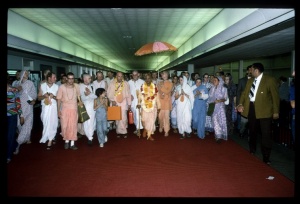BG 6.38: Difference between revisions
m (1 revision(s)) |
(Vanibot #0020 edit - link to the Version Compare feature) |
||
| Line 1: | Line 1: | ||
{{ | [[Category:Bhagavad-gita As It Is (1983+) - Chapter 06]] | ||
<div style="float:left">'''[[Bhagavad-gita As It Is (1983+)]] - [[BG 6 (1983+)|Chapter 6: Dhyana-yoga]]'''</div> | |||
<div style="float:right">[[File:Go-previous.png|link=BG 6.37]] '''[[BG 6.37]] - [[BG 6.39]]''' [[File:Go-next.png|link=BG 6.39]]</div> | |||
{{CompareVersions|BG|6.38|BG 1972|BG 1983+}} | |||
{{RandomImage}} | |||
==== TEXT 38 ==== | ==== TEXT 38 ==== | ||
<div class="devanagari"> | |||
:कच्चिन्नोभयविभ्रष्टश्छिन्नाभ्रमिव नश्यति । | |||
:अप्रतिष्ठो महाबाहो विमूढो ब्रह्मणः पथि ॥३८॥ | |||
</div> | |||
<div | <div class="verse"> | ||
:kaccin nobhaya-vibhraṣṭaś | |||
:chinnābhram iva naśyati | |||
:apratiṣṭho mahā-bāho | |||
:vimūḍho brahmaṇaḥ pathi | |||
</div> | </div> | ||
==== SYNONYMS ==== | ==== SYNONYMS ==== | ||
<div class="synonyms"> | |||
<div | ''kaccit''—whether; ''na''—not; ''ubhaya''—both; ''vibhraṣṭaḥ''—deviated from; ''chinna''—torn; ''abhram''—cloud; ''iva''—like; ''naśyati''—perishes; ''apratiṣṭhaḥ''—without any position; ''mahā-bāho''—O mighty-armed Kṛṣṇa; ''vimūḍhaḥ''—bewildered; ''brahmaṇaḥ''—of transcendence; ''pathi''—on the path. | ||
</div> | </div> | ||
==== TRANSLATION ==== | ==== TRANSLATION ==== | ||
<div class="translation"> | |||
<div | |||
O mighty-armed Kṛṣṇa, does not such a man, who is bewildered from the path of transcendence, fall away from both spiritual and material success and perish like a riven cloud, with no position in any sphere? | O mighty-armed Kṛṣṇa, does not such a man, who is bewildered from the path of transcendence, fall away from both spiritual and material success and perish like a riven cloud, with no position in any sphere? | ||
</div> | </div> | ||
==== PURPORT ==== | |||
= | <div class="purport"> | ||
There are two ways to progress. Those who are materialists have no interest in transcendence; therefore they are more interested in material advancement by economic development, or in promotion to the higher planets by appropriate work. When one takes to the path of transcendence, one has to cease all material activities and sacrifice all forms of so-called material happiness. If the aspiring transcendentalist fails, then he apparently loses both ways; in other words, he can enjoy neither material happiness nor spiritual success. He has no position; he is like a riven cloud. A cloud in the sky sometimes deviates from a small cloud and joins a big one. But if it cannot join a big one, then it is blown away by the wind and becomes a nonentity in the vast sky. The ''brahmaṇaḥ pathi'' is the path of transcendental realization through knowing oneself to be spiritual in essence, part and parcel of the Supreme Lord, who is manifested as Brahman, Paramātmā and Bhagavān. Lord Śrī Kṛṣṇa is the fullest manifestation of the Supreme Absolute Truth, and therefore one who is surrendered to the Supreme Person is a successful transcendentalist. To reach this goal of life through Brahman and Paramātmā realization takes many, many births (''bahūnāṁ janmanām ante '''([[BG 7.19]])'''''). Therefore the supermost path of transcendental realization is ''bhakti-yoga'', or Kṛṣṇa consciousness, the direct method. | |||
</div> | |||
<div | <div style="float:right; clear:both;">[[File:Go-previous.png|link=BG 6.37]] '''[[BG 6.37]] - [[BG 6.39]]''' [[File:Go-next.png|link=BG 6.39]]</div> | ||
__NOTOC__ | |||
</div> | __NOEDITSECTION__ | ||
__NOTOC__ | |||
Revision as of 22:08, 7 December 2017

A.C. Bhaktivedanta Swami Prabhupada
TEXT 38
- कच्चिन्नोभयविभ्रष्टश्छिन्नाभ्रमिव नश्यति ।
- अप्रतिष्ठो महाबाहो विमूढो ब्रह्मणः पथि ॥३८॥
- kaccin nobhaya-vibhraṣṭaś
- chinnābhram iva naśyati
- apratiṣṭho mahā-bāho
- vimūḍho brahmaṇaḥ pathi
SYNONYMS
kaccit—whether; na—not; ubhaya—both; vibhraṣṭaḥ—deviated from; chinna—torn; abhram—cloud; iva—like; naśyati—perishes; apratiṣṭhaḥ—without any position; mahā-bāho—O mighty-armed Kṛṣṇa; vimūḍhaḥ—bewildered; brahmaṇaḥ—of transcendence; pathi—on the path.
TRANSLATION
O mighty-armed Kṛṣṇa, does not such a man, who is bewildered from the path of transcendence, fall away from both spiritual and material success and perish like a riven cloud, with no position in any sphere?
PURPORT
There are two ways to progress. Those who are materialists have no interest in transcendence; therefore they are more interested in material advancement by economic development, or in promotion to the higher planets by appropriate work. When one takes to the path of transcendence, one has to cease all material activities and sacrifice all forms of so-called material happiness. If the aspiring transcendentalist fails, then he apparently loses both ways; in other words, he can enjoy neither material happiness nor spiritual success. He has no position; he is like a riven cloud. A cloud in the sky sometimes deviates from a small cloud and joins a big one. But if it cannot join a big one, then it is blown away by the wind and becomes a nonentity in the vast sky. The brahmaṇaḥ pathi is the path of transcendental realization through knowing oneself to be spiritual in essence, part and parcel of the Supreme Lord, who is manifested as Brahman, Paramātmā and Bhagavān. Lord Śrī Kṛṣṇa is the fullest manifestation of the Supreme Absolute Truth, and therefore one who is surrendered to the Supreme Person is a successful transcendentalist. To reach this goal of life through Brahman and Paramātmā realization takes many, many births (bahūnāṁ janmanām ante (BG 7.19)). Therefore the supermost path of transcendental realization is bhakti-yoga, or Kṛṣṇa consciousness, the direct method.